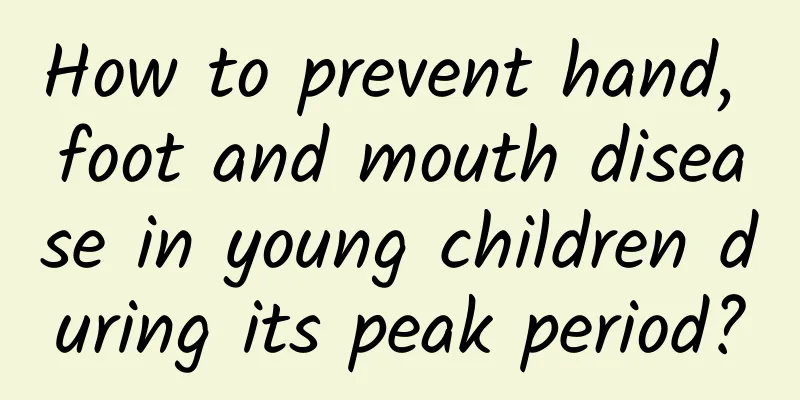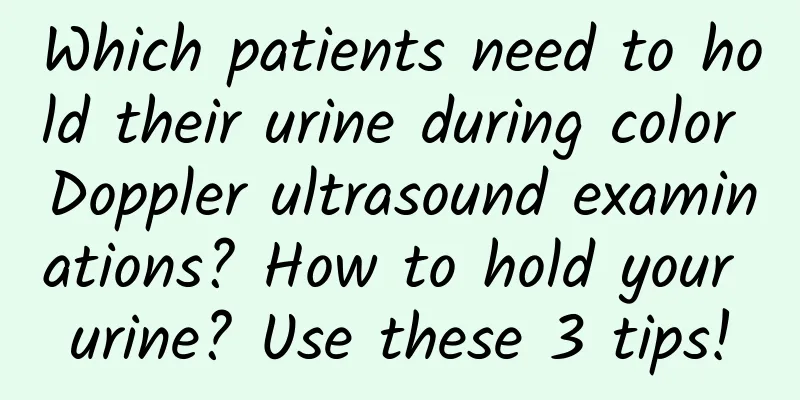How to prevent hand, foot and mouth disease in young children during its peak period?

|
The weather starts to get cooler in autumn and winter, which is also the peak season for infectious diseases. Hand, mouth, foot and mouth disease (Hand-mouth-foot disease) is a common acute febrile rash infectious disease that mostly occurs in children under 5 years old, especially children under 3 years old. The incidence rate is highest. Most children can recover within 7-10 days, but a very small number of children have their condition worsen, develop serious complications and even threaten their life safety. Hand, foot and mouth disease may occur throughout the year, with peak periods in summer and autumn. Summer is from April to July, and autumn is from September to October. Hand, foot and mouth disease is mainly caused by enterovirus infection, with Coxsackie A16 and enterovirus 71 (Enterovirus 71, EV-A71) being the most common. What are the symptoms of hand, foot and mouth disease? The incubation period of hand, foot and mouth disease is generally 3 to 7 days. The main symptoms are maculopapular rashes and herpes on the hands, feet, mouth, buttocks, etc., as well as oral pain and drooling. Depending on the severity of the clinical condition, it is usually divided into common cases and severe cases. Common cases generally have the following symptoms: Acute onset may or may not be accompanied by fever, and symptoms include cough, runny nose, loss of appetite, etc. Sporadic herpes and rashes can be seen on the hands, feet, buttocks, and some children may also have scattered rashes and herpes on the trunk. Ulcers often occur in the tongue, buccal mucosa, hard palate, and other parts of the mouth, causing children to cry, drool, and have difficulty chewing and eating. The prognosis is good. The symptoms of hand, foot and mouth disease are generally mild, but in a few cases the child's condition progresses rapidly and may cause complications, especially for young children with weak immunity. If a child develops any of the following systemic complications, he or she may be diagnosed with a severe case. Nervous system: Complications such as aseptic meningitis, encephalitis, and brainstem encephalitis may occur. The child will have persistent fever and may also experience symptoms such as headache, vomiting, mental depression, drowsiness or irritability, limb tremors, nystagmus, and eye movement disorders. Respiratory system: Pulmonary edema, pulmonary hemorrhage, lung failure, etc. may occur. The child may have symptoms such as rapid and shallow breathing, difficulty breathing, cyanosis of the lips, and aggravated cough. Circulatory system: changes in heart rate (faster or slower), pale complexion, skin patterns, cold limbs, cyanosis of finger (toe) tips; sustained low blood pressure, prolonged capillary filling time or decreased myocardial contractility. Characteristics and hazards of hand, foot and mouth disease in young children: Highly contagious: Hand, foot and mouth disease is highly contagious and is mainly transmitted through the digestive tract, respiratory tract and close contact. Children with the disease and latently infected people are both sources of infection, among which the proportion of latently infected people is relatively large. It is more harmful to young children: Common hand, foot and mouth disease is not very harmful, but it can damage the skin and mucous membranes of the mouth, hands, feet, buttocks, etc., causing physical discomfort. Severe hand, foot and mouth disease, especially that caused by enterovirus 71 infection, is more harmful and can easily cause damage to various systems, resulting in severe manifestations such as aseptic meningitis, brainstem encephalitis, pulmonary hemorrhage, pulmonary edema, cardiopulmonary failure, etc. The disease progresses rapidly and may even lead to death, posing a serious threat to the life and health of children. Fast transmission: Hand, foot and mouth disease is caused by enterovirus, which has strong resistance to the outside world and is suitable for surviving in humid and hot environments. It is mainly transmitted through the fecal-oral route, and can also be transmitted through contact with respiratory secretions, herpes fluid and contaminated objects of children. It is especially easy to spread among children in childcare institutions. How to effectively prevent hand, foot and mouth disease? 1. Improve personal hygiene habits Wash your hands frequently: Educate your children to develop good hand-washing habits, especially after touching objects in public places, touching animals, going out and coming home, and using the toilet. In addition, teach your children to cover their mouths and noses with tissues or elbows when coughing or sneezing, and avoid covering their mouths directly with their hands. Avoid close contact with patients: During the peak period of hand, foot and mouth disease, try not to take your children to crowded places and avoid contact with infected children. 2. Keep your home clean Clean the environment regularly: Keep the home environment clean and tidy, and frequently clean children’s toys, tables, chairs and other items that they frequently touch. Regular ventilation and disinfection: Keep the room ventilated, open windows regularly for ventilation, and use disinfectant to wipe tabletops and other items. Infant bottles, pacifiers and other tableware should be thoroughly cleaned and disinfected before and after use. 3. Pay attention to diet and nutrition Provide a nutritionally balanced diet: Provide children with a diverse diet rich in nutrients such as vitamin C, vitamin D and zinc to enhance their immunity. Food hygiene: Ensure the hygiene and safety of food, avoid eating raw or uncooked food, try not to eat leftovers, and be sure to heat up if you eat it occasionally. 4. Get the hand, foot and mouth disease vaccine Vaccination against hand, foot and mouth disease is one of the effective measures to prevent hand, foot and mouth disease in young children. In 2016, my country has launched EV71 (inactivated enterovirus 71 vaccine) for the prevention of hand, foot and mouth disease. It is recommended for children aged 6 months to 5 years old to be vaccinated. Young children should try to complete two vaccinations before 12 months of age to maximize the protective effect of the vaccine as early as possible. It should be noted that although vaccination against hand, foot and mouth disease can help prevent the disease, it does not mean that the risk of infection can be completely eliminated. In short, hand, foot and mouth disease in young children is not scary. Most children have a good prognosis, and mild symptoms usually do not require special treatment to recover. Therefore, if your child is diagnosed with hand, foot and mouth disease, don’t worry too much. Early detection and early treatment can effectively protect the health of your child. If your child shows relevant symptoms, you must seek medical attention in time and follow the doctor's advice to isolate at home and avoid going to public places. The views in this article only represent personal opinions. If you have any related questions, it is recommended to consult a professional doctor. (Bai Lina, Lingshou County People's Hospital, Shijiazhuang City, Hebei Province) |
>>: The harm of "second-hand smoke" and "third-hand smoke" to teenagers
Recommend
What is the sweetness of kiwi fruit? What are the requirements for selecting kiwi fruit?
We all know that kiwi fruit is rich in vitamins, ...
32 weeks pregnant vaginal pain
During pregnancy, women's physical constituti...
What can pregnant women eat to relieve back pain?
During pregnancy, pregnant women's bodies gra...
Why do women always have a little bloating in their stomachs?
Women always experience bloating and pain in thei...
How to solve the problem of coccyx protrusion after childbirth
Postpartum coccygeal herniation has become a majo...
Taking the initiative to do a digital rectal examination is a sign of a man’s maturity!
Addendum 1: When these abnormalities occur in our...
Is it better for girls to have big or small nipples?
Breasts are very important organs for women, so m...
What to do if you have bleeding after a cesarean section
With the continuous advancement of medical care, ...
Is it better to see a Chinese doctor or a Western doctor for gynecological diseases?
Gynecological diseases are a relatively common fe...
How to access P station official website on mobile phone 2020 login P station latest tutorial
P站 is a very famous comic website in Japan. Here,...
How long is the best time to have a painless abortion during pregnancy?
In life, many female friends get pregnant because...
What causes polycystic ovary
Many women find it difficult to get pregnant. Aft...
Abdominal pain after abortion
If a woman becomes pregnant without being prepare...









